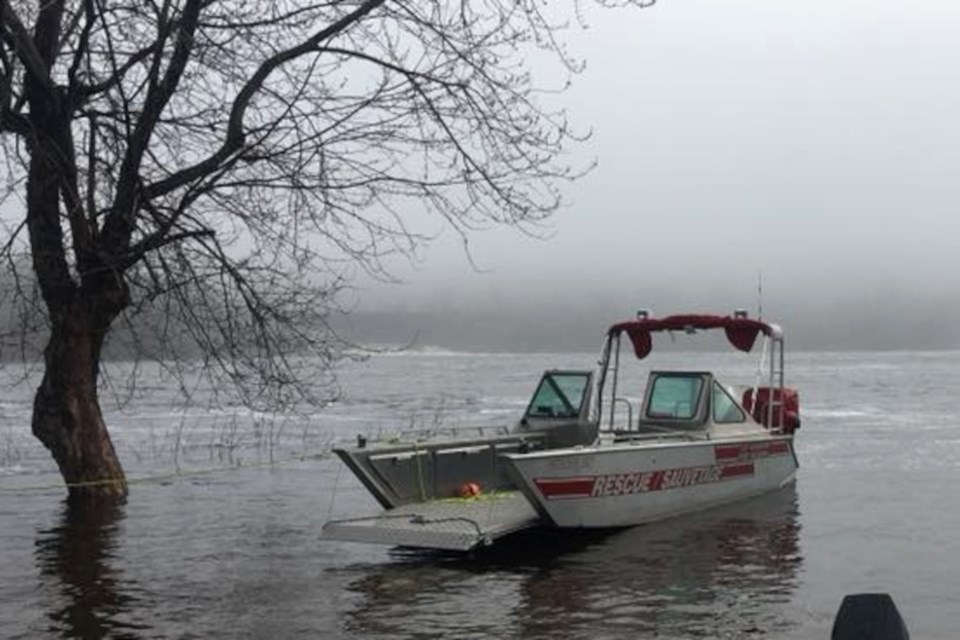The rescue boat on Lake Wanapitei was removed by Greater Sudbury Fire Services in 2020, and the lake is now served by a boat stationed at the Minnow Lake Station.
The boat’s removal has been a common point of contention in the ongoing debate regarding the Skead volunteer fire station and the quality of city response to that area of Greater Sudbury.
Last week, Sudbury.com reported on the 10-year anniversary of the Lake Wanapitei boating tragedy of 2013, in which three people died following a boat crash and subsequent island fire.
In this news coverage, Skead-based advocates cited a need for a rescue boat to return to Lake Wanapitei, lambasting its removal as a step in the wrong direction.
“The boat was in the water, ready to go, equipped,” said Toni Kritz-Roque, whose brother, Michael Kritz, died in the 2013 incident.
With the boat now removed, she noted that people on Lake Wanapitei now rely on a rescue boat several kilometres down the road at the Minnow Lake station in Sudbury.
Sudbury.com connected with Deputy Chief Nathan Melin to find out when the boat was removed, why it was removed and whether it’s coming back.
The answers to these questions were: the spring of 2020, safety concerns, and there’s no current plan to bring one back.
“There were multiple reasons why it was removed,” he said, citing the No. 1 factor as being that the old boat stationed in the water at Lake Wanapitei was purchased “off the shelf” and wasn’t designed as a rescue vehicle.
People used to use whatever they had for emergency rescues, he said, “but with liability these days and certification coming in, it makes it that much harder. ... You need the proper equipment to keep your responders safe so that they can do the appropriate rescue.”
The old boat was flagged as a health and safety concern unfit for rescue purposes, and removed in the spring of 2020.
At the time, Greater Sudbury Fire Services was purchasing design-built water rescue vehicles, and when new equipment came in they decided to station it in Minnow Lake, where it was centrally located to offer “the quickest access to the 330 lakes we service.”
A second design-built rescue boat was later purchased and stationed at the Long Lake station. These are currently the fire service’s only two rescue boats.
The boats are designed to allow for the rescue of patients from the water, with a broad enough base that they won’t flip in the event there are two or three responders on one side. They also have room for stretchers, backboards, and other equipment and allowances for injured people.
All the equipment needed for water rescue is already on the boat, which is attached to a truck and ready to drive out to the scene of water incidents throughout Greater Sudbury. Trips to Lake Wanapitei take approximately 25 minutes from receiving the call to being in the water.
Although Melin said there’s an argument to be made that launching the boat takes more time than dropping firefighters into a boat that’s already in the water, he noted that when there was a boat already in the water, firefighters had to transfer equipment into the boat.
Now, he said, “From the moment they arrive, they back the boat into the launch site, and the boat is deployable at that point in time.”
Another issue are the provincially mandated training requirements for firefighters, which make it difficult for volunteer firefighters to become certified to respond to calls involving a water rescue boat.
The new training standards require volunteer firefighters to undergo a minimum of 280 hours of training to achieve base-level certification — a requirement the province is mandating by July 1, 2026, but which the city has already been moving toward.
By July 1, 2028, an additional layer of training for technical rescue will be required, which includes 100 hours of training to become certified to be on rescue boats, plus an additional 40 hours per year to maintain certification.
Although the requirement is still a few years away, Melin said the Ministry of Labour already expects it, meaning only fully trained firefighters are allowed to operate the watercraft.
With the city focusing on achieving base-level certification for volunteer firefighters, he said they’re not yet offering rescue boat training to volunteer firefighters, but might consider doing so at some point in the future.
Given the number of training hours required, he said, “It makes it very difficult for them to achieve it and sustain it.”
The training, he said, is administered through an affiliate and is the same training a member of the Coast Guard would receive. It includes radio, medical, sonar and other technical training around watercraft.
Greater Sudbury Fire Services has also been relying on area marinas for assistance on certain calls deemed non-emergent, such as when boaters run out of fuel on the lake.
“We are looking at getting away from what I’d call our ‘CAA calls’,” he said, adding that unless the situation is coupled with poor weather conditions or something else that might make it emergent, boaters can phone a marina and pay for their services.
“If a vehicle ran out of gas, we wouldn’t be going to attend to it or provide it with gas.”
On June 27, Greater Sudbury’s elected officials voted to have the city repair the Skead volunteer fire station and reopen it immediately.
Despite the Skead station’s imminent reopening, Melin said Greater Sudbury Fire Services is not currently looking at stationing a rescue boat on Lake Wanapitei, with the area slated to continue being served by the boat at the Minnow Lake station.
Both the Minnow Lake and Long Lake stations (where the city’s two rescue boats are located) are career firefighter locations.
Although community members have been rallying together in an attempt to bring up volunteerism in Skead, the station currently has one member.
Tyler Clarke covers city hall and political affairs for Sudbury.com.
